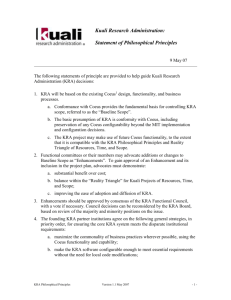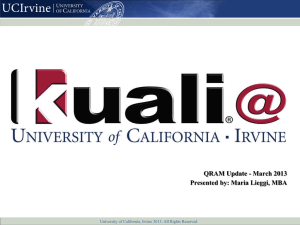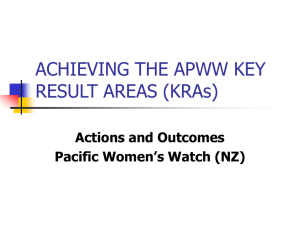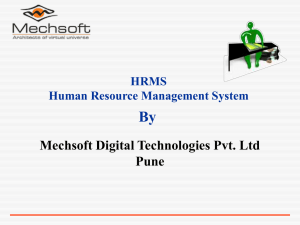KRA/KFS Integration Team
advertisement
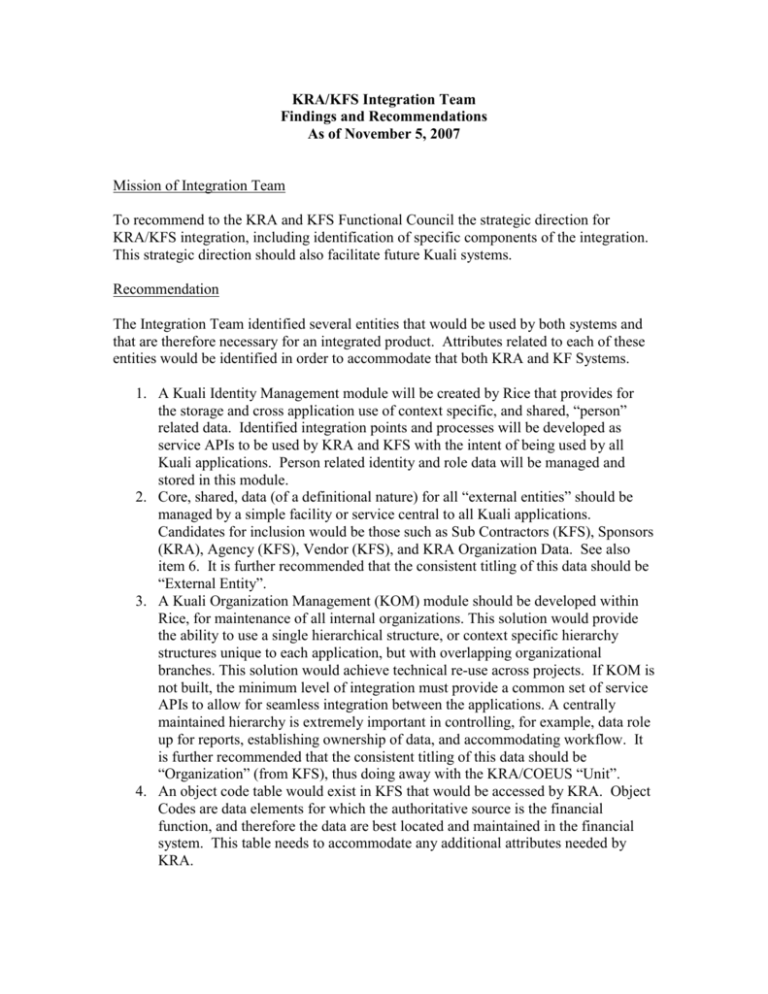
KRA/KFS Integration Team Findings and Recommendations As of November 5, 2007 Mission of Integration Team To recommend to the KRA and KFS Functional Council the strategic direction for KRA/KFS integration, including identification of specific components of the integration. This strategic direction should also facilitate future Kuali systems. Recommendation The Integration Team identified several entities that would be used by both systems and that are therefore necessary for an integrated product. Attributes related to each of these entities would be identified in order to accommodate that both KRA and KF Systems. 1. A Kuali Identity Management module will be created by Rice that provides for the storage and cross application use of context specific, and shared, “person” related data. Identified integration points and processes will be developed as service APIs to be used by KRA and KFS with the intent of being used by all Kuali applications. Person related identity and role data will be managed and stored in this module. 2. Core, shared, data (of a definitional nature) for all “external entities” should be managed by a simple facility or service central to all Kuali applications. Candidates for inclusion would be those such as Sub Contractors (KFS), Sponsors (KRA), Agency (KFS), Vendor (KFS), and KRA Organization Data. See also item 6. It is further recommended that the consistent titling of this data should be “External Entity”. 3. A Kuali Organization Management (KOM) module should be developed within Rice, for maintenance of all internal organizations. This solution would provide the ability to use a single hierarchical structure, or context specific hierarchy structures unique to each application, but with overlapping organizational branches. This solution would achieve technical re-use across projects. If KOM is not built, the minimum level of integration must provide a common set of service APIs to allow for seamless integration between the applications. A centrally maintained hierarchy is extremely important in controlling, for example, data role up for reports, establishing ownership of data, and accommodating workflow. It is further recommended that the consistent titling of this data should be “Organization” (from KFS), thus doing away with the KRA/COEUS “Unit”. 4. An object code table would exist in KFS that would be accessed by KRA. Object Codes are data elements for which the authoritative source is the financial function, and therefore the data are best located and maintained in the financial system. This table needs to accommodate any additional attributes needed by KRA. 5. Proposal data are necessary for both systems but should be maintained in KRA, as the research administration function is the authoritative source. Certain proposal data are necessary for financial post award administration that is managed out of the financial system. This table will need to accommodate any additional attributes needed by KFS. 6. Sponsor data are necessary for both system but the authoritative system should be KRA. Certain sponsor data maintained in KRA are necessary for financial post award administration that is managed out of the financial system. This table will need to accommodate any additional attributes needed by KFS. Further review of external entities should occur to see if that central table (referred to in Item 2 above) can accommodate Sponsor. NOTE: This analysis was done during the10/23 meeting, and we agreed that Sponsor should be accommodated. 7. Research Administration may require a separate mapping process for object codes for proposal budgets. KRA calls these budget categories and KFS calls them levels. The Integration Team recommends that KRA and KFS budget subcommittee review the best process for accommodating separate mapping while maintaining the integrity of financial data for financial reporting purposes. Summary The seven recommendations made at this time by the Integration Team are considered to be necessary for an integrated product. In addition to the specific recommendations the Integration Team has been tasked with looking at the details of each of the above entities to determine more detailed data and functional requirements. The technical teams for KRA, KFS and RICE will examine these specifications to determine the best actual solution for the long and short terms given resource constraints and timing.


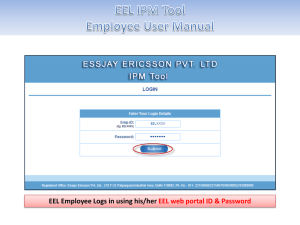
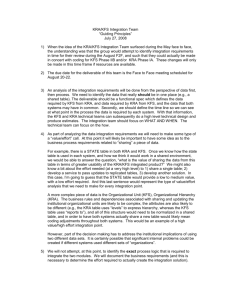



![[#KFSTP-1397] Collection Activity](http://s3.studylib.net/store/data/007301192_1-dd6f1230b3c65cff3429319b4ff035e1-300x300.png)
